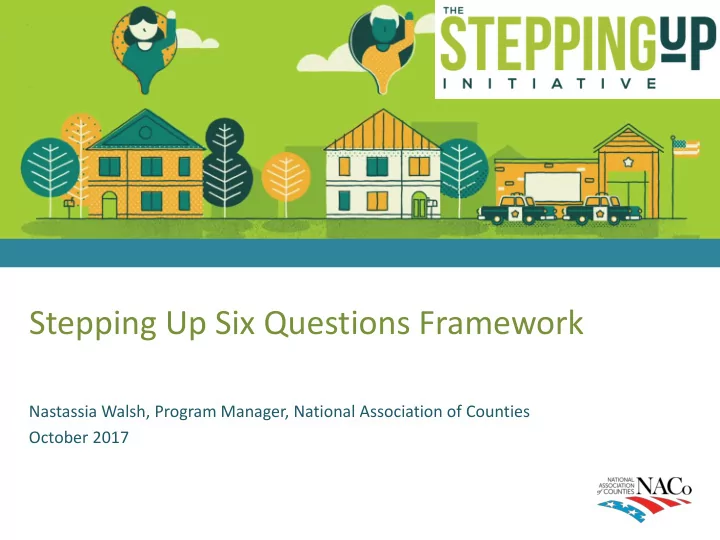

Stepping Up Six Questions Framework Nastassia Walsh, Program Manager, National Association of Counties October 2017
Stepping Up Launched May 2015 2
Counties are Stepping Up!
Iowa is Stepping Up! Lyon Osceola Dickinson Emmet Winnebago Worth Mitchell Howard Winneshiek Allamakee Kossuth Sioux O'brien Clay Palo Alto Hancock Cerro Gordo Floyd Chickasaw Clayton Fayette Buena Vista Humboldt Bremer Plymouth Cherokee Pocahontas Wright Franklin Butler Delaware Buchanan Dubuque Webster Black Hawk Woodbury Ida Sac Calhoun Hamilton Hardin Grundy Jackson Jones Tama Benton Linn Monona Crawford Carroll Greene Boone Story Marshall Clinton Cedar Harrison Shelby Audubon Guthrie Dallas Polk Jasper Poweshiek Iowa Johnson Scott Muscatine Pottawattamie Madison Warren Marion Mahaska Keokuk Washington Cass Adair Louisa Mills Montgomery Clarke Lucas Monroe Wapello Jefferson Adams Union Henry Des Moines Van Buren Fremont Page Wayne Appanoose Davis Taylor Ringgold Decatur Lee
To Reduce the Number of People With Mental Illnesses in Jails, County Leaders Should Ask These Questions 1. Is your leadership committed? 2. Do you have timely screening and assessment? 3. Do you have baseline data? 4. Have you conducted a comprehensive process analysis and service inventory? 5. Have you prioritized policy, practice, and funding? Released in January 2017 6. Do you track progress?
Question 1: Is Your Leadership Committed? Mandate from leaders responsible for the county budget Representative planning team Commitment to vision, mission, and guiding principles Designated planning team chairperson Designated project coordinator 6
Question 2: Do You Have Timely Screening and Assessment? System-wide definitions of mental illness and substance use disorders Validated screening and assessment tools for mental illnesses and substance use disorders Efficient screening and assessment process Validated assessment for pretrial risk Mechanisms for information sharing
Question 3: Do You Have Baseline Data? System-wide definition of recidivism Electronically collected data Baseline data on the general population in jail Routine reports generated by a county agency, state agency, or outside contractor
Four Key Measures 2. Shorten the 1. Reduce the length of stay in number of people jails for people with mental with mental illnesses booked illnesses into jails Intensive Outpatient Outpatient 3. Increase the Treatment Treatment Integrated Peer number of people MH & SU Support 4. Reduce rates of Services Services with mental recidivism Supported Case Employment Management illnesses Psychopharma Crisis connected to -cology Services Supportive Housing treatment
Question 4: Have you conducted a Comprehensive Process Analysis and Service Inventory? Detailed process analysis Decision-making process? Timely and efficient? Type of information? Accessibility? Properly trained staff? Service capacity & gaps identified What services exist (community and jail)? Capacity needs? Waitlists? Population projections? Evidence-based programs & practices identified What works to meet needs of population and reduce recidivism?
Question 5: Have you prioritized policy, practice, and funding? Prioritized strategies Detailed description of needs Estimates/projections of the impact of new strategies Estimates/projections account for external funding streams Description of gaps in funding best met through county investment
Prioritizing System Improvements 1 2 3 4 Shorten Increase Lower Reduce The number The average The percentage Rates of of people with length of stay in of connection recidivism MI booked jails to care Into jail • • Police-Mental Expand community- • Routine screening Health based treatment & and assessment • Apply Risk-Need- Collaboration housing options for mental health Responsivity • programs Streamline access to and SUDs in jail principle • CIT training for LE services • Pretrial mental • Use evidence- • and first Leverage Medicaid health diversion based practices responders and other federal, • Pretrial risk • Specialized • Mobile crisis or state, and local screening, Probation Co-responder resources release, and • Ongoing program • model Healthcare supervision evaluation • Crisis diversion enrollment • Bail policy reform • centers Telepsychiatry • Correctional • • Policing of quality Peer support officer training of life offenses specialists
Potential Funding Sources Department of Justice Health and Human Services Housing and Urban Development FEDERAL • • • Second Chance Act Mental Health / Substance Continuum of Care Program • • Justice and Mental Abuse Block Grants Housing Choice Vouchers • Health Collaboration SAMHSA Diversion Grants (Section 8) / Public Housing • • Program SAMHSA Homeless Programs Section 811 • • Byrne Memorial Justice Community Services Block Grant Veterans Affairs • Assistance Grant Social Services Block Grant • Grant and Per Diem Program Program • Supportive Services for Veterans and Families FEDERAL / STATE • Mental health general fund dollars STATE • Community corrections Medicaid • State housing trust funds • Justice reinvestment PHILANTHROPY / COUNTY / • Foundations • General funds PRIVATE CITY • Corporations • County-specific tax levies • Managed care • Municipal/city funds • Hospitals
Question 6: Do You Track Progress? Reporting timeline on four key measures Process for progress reporting Ongoing evaluation of programming implementation Ongoing evaluation of programming impact 14
Track Progress on Four Key Measures 2. Shorten the 1. Reduce the length of stay in number of people jails for people with mental with mental illnesses booked illnesses into jails Intensive Outpatient Outpatient 3. Increase the Treatment Treatment Integrated Peer number of people MH & SU Support 4. Reduce rates of Services Services with mental recidivism Supported Case Employment Management illnesses Psychopharma Crisis connected to -cology Services Supportive Housing treatment
Resources Toolkit
Upcoming Stepping Up TA Resources www.naco.org Monthly Webinars and Networking Calls • Next Webinar: Addressing Housing Needs of People with Mental Illnesses in Jails (November 9 at 2pm ET) • Network Call on Housing (November 16 at 2pm ET) • Register at www.StepUpTogether.org/Toolkit Quarterly Small-Group Networking and TA Calls • Rural, Mid-Size and Large/Urban Counties • Next calls in December. Email Nastassia to join. Coming Soon! • A Project Coordinator Handbook • Self-Assessment Tool • Guidance on measuring the prevalence of people with mental illnesses in jails • Guidance on establishing baseline data
THANK YOU For more information, please contact: Nastassia Walsh, Program Manager, National Association of Counties nwalsh@naco.org
Recommend
More recommend